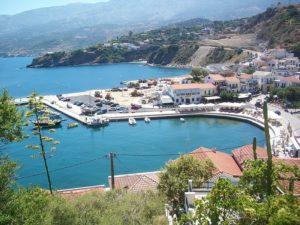 About 70 years ago, a man and his wife left their home on a Greek island and settled in the United States. For a few decades, they were pleased with their decision. Then came some bad news: the man was diagnosed with terminal lung cancer. His doctors told him to go home and get his affairs in order. He didn’t have long to live.
About 70 years ago, a man and his wife left their home on a Greek island and settled in the United States. For a few decades, they were pleased with their decision. Then came some bad news: the man was diagnosed with terminal lung cancer. His doctors told him to go home and get his affairs in order. He didn’t have long to live.
The man and his wife weighed their options. They decided to go back to Evdilos on their native island of Ikaria. They would live with his parents as he rode out his last precious days.
More than 30 years later, a writer for the New York Times found him robustly alive and kicking in his 90s. As for his American doctors? All of them had died.
You can read the whole of this fascinating and inspiring story here. Its title is the absolute best: “The Island Were People Forget to Die.”
 This summer, Joanne and I will be making our first trip to Greece, the homeland of my father’s parents. And where in Greece were my grandparents born and raised? None other than the town of Evdilos on the island of Ikaria, just like our hero in the story above. As the Times article notes, Ikaria is one of just a handful of “blue zones” left in the world today – a place where a high percentage of residents routinely remain productive and active well into their 90s.
This summer, Joanne and I will be making our first trip to Greece, the homeland of my father’s parents. And where in Greece were my grandparents born and raised? None other than the town of Evdilos on the island of Ikaria, just like our hero in the story above. As the Times article notes, Ikaria is one of just a handful of “blue zones” left in the world today – a place where a high percentage of residents routinely remain productive and active well into their 90s.
That this one is my ancestral home gives this trip a whole new level of meaning for us.
Why do Ikarians live such long and vibrant lives? The reasons are many, including things like eating a Mediterranean diet, napping daily, and drinking red wine moderately. Seniors stay with family, not with strangers in “homes” or “retirement communities.” They stay productive and are honored by their family and friends.
An Ikaria native living here in the US shared a few of the more unique differences, such as the absence of watches. Locals tend not to wear them. If an Ikarian cannot get something done today, “maybe he can get it done next month.” (The words “maybe” and “month” seem key here.)
I have also asked our friends at the Weston A. Price Foundation if they might have insight to the longevity of Ikarians and look forward to learning more from the Foundation about native Ikarian food ways in particular.
But that, I’m afraid, must wait. The office is manned and backed up by my staff and some on-call colleagues. The homestead is manned and the dog alerted. Cell phones are activated in case of emergency. I hope to have some native Ikarian, Evdilos and Glaros secrets upon our return…
– Bill
Efdilos image by C messier, via Wikimedia Commons